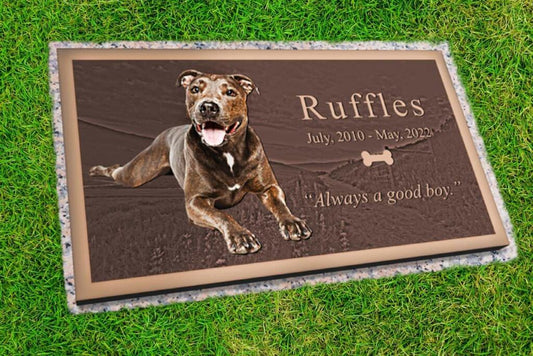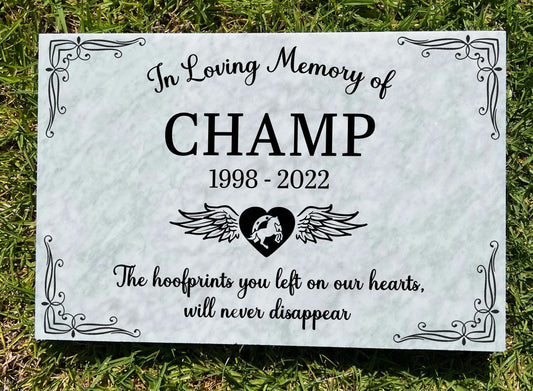Loving our pets means doing everything possible to ensure they live long, vibrant lives by our sides.
At Headstones4Pets, we understand the profound bond between pets and their families and how devastating it is when that bond is broken too soon.
While we take pride in helping pet owners honor their companions with beautiful memorial stones, our greatest wish is for your pet to thrive for years to come.
Here are 10 crucial health tips every pet owner needs to implement today, not just for longevity, but for quality of life.
1. Preventative Veterinary Care Saves Lives
The most important health decision you'll make isn't treating illness, it's preventing it. Annual wellness exams can identify health concerns before they become emergencies.
According to the American Veterinary Medical Association, pets age faster than humans, making regular checkups essential even when they appear healthy.
Many serious conditions like kidney disease, heart problems, and cancer show minimal symptoms until advanced stages.
Early detection dramatically improves outcomes.
Action step: Schedule wellness visits every 6-12 months depending on your pet's age and health status.
2. Nutrition Is Medicine
The pet food aisle can be overwhelming, but what you feed your companion directly impacts their lifespan.
Low-quality foods filled with fillers and artificial ingredients contribute to obesity, digestive issues, and chronic inflammation.
Dr. Karen Becker of Healthy Pets emphasizes: "The foundation of health begins with proper species-appropriate nutrition. Many health issues I treat daily are directly connected to poor diet quality."
Action step: Consult your veterinarian about the optimal diet for your specific pet's needs, considering their age, breed, and health conditions.
3. Weight Management Is Non-Negotiable
Over 50% of American pets are overweight or obese, according to the Association for Pet Obesity Prevention.
This epidemic shortens lives by increasing risks for diabetes, joint disease, heart issues, and cancer.
Just 2-3 extra pounds on a medium-sized dog is equivalent to 20-30 pounds on an average person, imagine carrying that burden constantly.
Action step: Ask your vet for your pet's ideal weight range and establish portion control and regular exercise to maintain it.
4. Mental Stimulation Prevents Behavioral Issues
Physical exercise is just half the equation, your pet's brain needs workouts too. Boredom leads to destructive behaviors, anxiety, and even depression.
Research from the American Kennel Club shows that mentally stimulated pets display fewer behavioral problems and adapt better to household changes.
Action step: Implement daily enrichment through puzzle toys, training sessions, or scent work appropriate for your pet's species.
5. Dental Care Extends Lifespan
Over 80% of dogs and 70% of cats show signs of dental disease by age three.
Beyond bad breath, poor oral health allows bacteria to enter the bloodstream, potentially damaging vital organs like the heart and kidneys.
The Cornell University College of Veterinary Medicine notes that proper dental care can add 1-3 years to your pet's life.
Action step: Establish a dental care routine including brushing (with pet-specific toothpaste), dental treats, and professional cleanings when recommended.
6. Know Your Breed's Health Risks
Different breeds face different genetic predispositions. Responsible ownership means understanding these risks and implementing targeted preventative measures.
For example, large-breed dogs often develop joint issues, while brachycephalic (flat-faced) breeds frequently experience respiratory and eye problems.
Certain cat breeds are prone to heart or kidney conditions.
Action step: Research your pet's breed-specific health concerns and discuss prevention strategies with your veterinarian.
7. Parasite Prevention Is Essential
Fleas, ticks, mosquitoes, and intestinal parasites threaten your pet's wellbeing.
Beyond discomfort, these pests transmit serious diseases like Lyme disease, heartworm, and intestinal issues.
The Companion Animal Parasite Council recommends year-round parasite prevention regardless of climate or season.
Action step: Maintain consistent parasite prevention protocols recommended by your veterinarian.
8. Create a Safe Environment
Many household hazards endanger pets, from toxic plants and chemicals to choking risks.
The ASPCA Animal Poison Control Center handles over 400,000 cases of pet poisoning annually which most are preventable.
Action step: Pet-proof your home by securing toxins, removing dangerous plants, and eliminating choking/strangulation hazards.
9. Establish an Emergency Fund
When medical emergencies strike, financial constraints shouldn't limit your options.
Emergency veterinary care can cost thousands, especially for complex conditions or surgeries.
Action step: Build a dedicated pet emergency fund or investigate pet insurance options through providers like Trupanion or Healthy Paws.
10. Recognize Early Warning Signs
Pets instinctively hide illness a survival mechanism from their wild ancestors. By the time symptoms become obvious, conditions have often progressed significantly.
Subtle changes in behavior, appetite, water consumption, energy levels, or bathroom habits can signal serious issues requiring immediate attention.
Action step: Keep a pet health journal documenting normal patterns, and consult your veterinarian promptly about concerning changes.
Cherishing Every Moment
At Headstones4pet, we've helped countless families honor beloved companions with personalized pet headstones and custom pet grave markers.
These beautiful tributes celebrate the unconditional love our pets give us throughout their lives.
Yet our deepest wish is that this need remains distant for your family. By implementing these essential health practices, you're not just extending your pet's life—you're enhancing its quality, ensuring more joyful years together.
When that difficult day eventually comes, remember that honoring your pet's memory is part of the healing journey. ;
Whether through outdoor pet memorials or creating a special remembrance space, acknowledging your companion's impact helps transform grief into gratitude.
For more information about pet health or memorial options, visit Headstones4pet.net or consult your veterinarian about tailoring these recommendations to your specific pet's needs.
This guide is intended for educational purposes only and should not replace professional veterinary advice.




